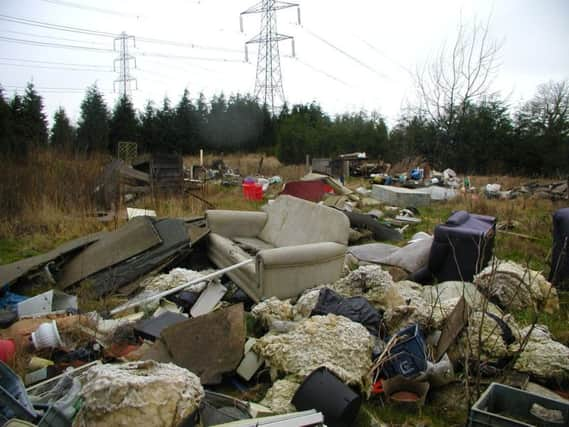Rural businesses are putting themselves at risk of waste crime, research reveals


A new survey commissioned by ‘right Waste, right Place’ shows the number of those falling victim in the last three years rose to 43% in some areas such as London and the South East, with owners turning to councils for help or being forced to deal with the fallout themselves.
The clean-up cost has been previously estimated to be £100m-£150m per annum by the CLA.
Advertisement
Advertisement
The research based on telephone interviews with over 500 rural businesses shows the fundamental problem is to do with lack of understanding with many leaving themselves open to fines, prosecution and imprisonment due to lack of awareness of their obligations under ‘Duty of Care’ law. Farmers and landowners can also be the victim of illegal waste operators using their land to store waste which is subsequently abandoned, leaving landowners with costly clean up bills.
Depending on the region of the research, up to 100% of survey respondents believed they were compliant with ‘Duty of Care’ law, whereas previous research carried out by ‘right Waste, right Place’ reveals that only half are likely to be compliant. The campaign believes that this lack of understanding of ‘Duty of Care’ is directly contributing to waste being illegally dumped in rural areas.
In response to these alarming statistics, ‘right Waste, right Place’ has launched sector-focused material aimed at increasing awareness amongst agriculture and land management businesses. This includes an ‘Agriculture Simple Guide to Duty of Care’ published online alongside other handy reference guides including case studies; Need to Know cards; and a programme of events including showcases at agricultural fairs across the country.
Sam Corp, Head of Regulation at the ESA, commented: “Our survey shows that the effects of people not doing the right thing with their waste are very real for agricultural businesses. Almost a third told us they had experienced fly-tipping on their land, which is not only a costly inconvenience - it can be a major health hazard to people, livestock and livelihoods.
Advertisement
Advertisement
“However it is clear that despite their vulnerability many businesses are running the risk of inadvertently contributing to waste crime by believing they are complying with the legislation when the evidence is there that they are not. We believe this is a particular issue where the waste is handed from one party to another.
“We’d urge businesses to join in alliance with the ‘right Waste, right Place’ campaign to tackle this issue together. We can provide practical support through easy-to-understand reference guides and are keen to work in partnership with businesses to establish best practices and raise awareness of this issue throughout the industry.”
Building on its national success, attracting support from concerned stakeholders including The National Trust and Keep Britain Tidy, the campaign is now calling on agricultural industries, associations, and local authorities in rural areas to sign-up to and support the campaign. In so doing, they can make use of the free materials and information resources provided. Thereby they can help their customers and members to comply with the law as well as reduce the risk of themselves becoming a victim of waste crime.
Nicky Cunningham, Deputy Director of Waste Regulation at the Environment Agency, said: “It’s crucial that all businesses understand their duty of care responsibilities for the waste they produce. Too often, when these responsibilities are misunderstood or ignored, we see the impact of waste crime where waste is deliberately dumped on land with no permit. This can cause serious pollution, put communities at risk and undermines legitimate businesses that are doing the right thing. And even if the landowner has no involvement, legally they may still be responsible for that waste and that could mean a large clear up bill. If you see or suspect waste crime activities are taking place please report it anonymously online to Crimestoppers www.crimestoppers-uk.org or call 0800 555 111.”
Advertisement
Advertisement
Judith Kelly, OBE, HMRC’s Deputy Director of Environmental Tax Policy, confirmed: “I’m delighted to see the work being done to promote duty of care. As the unlawful disposal of waste evades Landfill Tax and is unfair to those who take care to do the right thing with their waste, HMRC has launched a waste taskforce to complement the work done by the Environment Agency. Strengthening controls upstream will help prevent non-compliance, making it harder for operators to make mistakes or deliberately break the rules.”
Delivered through an interactive website (www.rightwasterightplace.com) and run by the Environmental Services Association (ESA), the national ‘right Waste, right Place’ campaign is supported by the Environment Agency (EA), Natural Resources Wales (NRW), the Chartered Institution of Wastes Management (CIWM) and the Environmental Services Association Education Trust (ESAET), and offers practical advice on how to manage waste safely and efficiently. It has already attracted the support of a collection of official ‘ambassadors’ spanning various sectors, including local authorities, associations such as the Federation of Small Businesses, waste management companies, housebuilders, construction companies, and charities.
Local businesses can find simple guides, Need to Know cards, case studies and videos online at www.rightwasterightplace.com or by emailing [email protected].